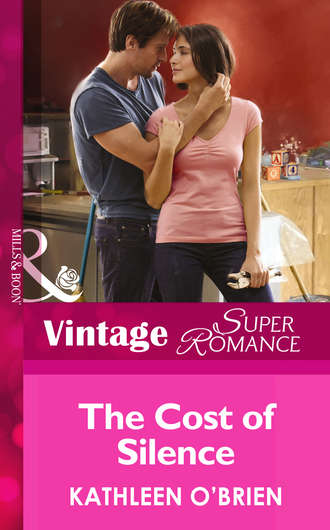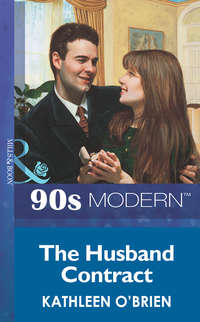
Полная версия
The Cost of Silence
Nana Lina made a disapproving sound between her teeth. Then, finally, she smiled. “If you boys were half as useless as you pretend to be, I’d have to get out the switch.”
“Ooh. The switch.” This had been Grandpa Colm’s running joke. No one, neither their parents nor their grandparents, had ever laid a violent finger on any of them, but Grandpa Colm had loved to refer to the mythical switch as if he beat them daily.
Every now and then, when she was feeling particularly affectionate, Nana Lina would borrow the jest. It gave Red a warm feeling now, remembering his vibrant grandfather and the musical Irish lilt he’d never dropped, no matter how many years he’d been in the United States.
No, no one had ever whipped the Malone boys. No one had needed to. Their parents had been intelligent, calm, loving. And the three brothers had never been bad kids, though of course they’d had their defiant moments. Red had been slap in the middle of his worst adolescent prickliness when their parents died.
But after the accident—one of those freak automobile catastrophes that happened a few miles from their own home—the rebellious attitude dropped from the boys like magic. Once they got a glimpse of true tragedy, they never again confused it with the little annoyances, like curfew or chores. No more mountains out of molehills.
“I wish Dylan Wigham had someone like you to turn to right now,” Red said thoughtfully. “He’s been having a rough time since Victor died.”
Nana Lina nodded. She knew the family well, as they all did. Victor hadn’t been her favorite person, but they were in the same social set and ended up at many of the same functions. And, of course, Red’s friendship with the Wighams meant that they got invited to most of the Malone/Diamante events.
She might not know all the details of Dylan’s struggles, but she knew that the boy had been in a rehab clinic for the past several weeks. “When is he getting out?”
“I’m not sure. Soon, I hope. Marianne needs him at home, I think. She’s pretty lonely.”
“Yes,” Nana Lina agreed, though her voice remained crisp. She wasn’t a fan of extravagant mourning. Though Red knew she missed Grandpa Colm every day of her life, she had turned to work to give her life meaning. Work and her grandsons.
Predictably, she thought everyone should do the same.
She gave Red a straight look. “I hope you’re not planning to try to fill that void yourself.”
“I spend as much time with her as I can,” he said. “But if you’re asking whether I’m romancing her, the answer is no. Of course. Victor’s only been gone two months, but even if it had been two years, Marianne and I are just friends.”
“Good.” Nana Lina never leaned back in her chair, but Red thought he saw a slight relaxation in her shoulders. “She’s not right for you.”
He laughed. “She hasn’t got enough starch?”
Nana Lina had said this about the brothers’ girlfriends so often it had become the code word for her disapproval. Conversely, when she said a woman did have starch, they knew it meant a world of respect. The first time they’d heard her say it, she’d been talking about their own mother. For in-laws, those two women had had an amazingly solid and close relationship.
“No, actually, she hasn’t,” Nana Lina said tartly. “She was probably born with starch. You can glimpse it, sometimes, underneath the silliness and the insecurity. But marrying Victor was probably the worst thing she could do. He valued her looks, but he didn’t value the qualities she possessed that were far more worthwhile. Consequently, she lost respect for them, too. So all she’s left with is a pretty face, which won’t hold anyone up in a crisis.”
Actually, Red thought that was a perceptive evaluation. And Nana Lina should know. She was still one of the most beautiful women he knew, with her silky waves of gorgeous silver hair and her lively, intelligent blue eyes set in a heart-shaped face. In pictures, he’d seen what a stunner she’d been as a young woman.
But she’d never let vanity control her. She worked as hard as any of the Malones, male or female, young or old. He’d seen her mussed and covered in flour, pulling all-nighters in the kitchen before Diamante took off enough to pay someone else to do all that. He’d seen her sweating and splashed with paint, or potting soil or sawdust. And she always looked amazing, vibrant and intelligent and in love with her life.
“I wish you could adopt Marianne,” he said. “I bet you could straighten her out in no time.”
Nana Lina laughed. “I’ve got my hands full, I’m afraid. But you don’t need me. You know how to help her. Tell her to spend less time picking out earrings and more time being genuinely productive. Get a job. Or, if that’s beneath a Wigham, she should do a Google search on the word volunteer. Or charity.”
To Red’s surprise, Nana Lina’s voice sounded sharper than usual. He gave her a more careful look. Was she a little pale? Just the other day, Colby had said he thought she looked tired.
“Okay. I’ll do that.” He tried to sound casual. “So, enough about Marianne. How are things going for you? Everything okay?”
She frowned and shook her head. “Everything is fine,” she said, “except that people keep coming in and distracting me, so that I’m never going to get this report analyzed. Don’t you have somewhere to be? Some property to buy, some widow to console?”
He stood, smiling. “Yes, ma’am,” he said. But he made a mental note to ask Colby what he thought. No way they were going to let Nana Lina get sick, even if it meant they had to get out the switch.
WHEN RED GOT OUTSIDE, squinting against the bright sun after hours in the artificial light, he saw a rectangular piece of paper hooked under his windshield wiper, and his sour mood turned even nastier. God. A ticket?
But it wasn’t. When he yanked it out, the wiper bouncing, he saw that it was a flyer for the Splash Camp kickoff, which was being held today at Baker Country Day School in Russian Hill.
Marianne Wigham must have put it there. She was volunteering at the kickoff. Damn it. How could he have forgotten? This was the first time she’d done anything official or public since Victor’s death. And since by now everyone at the Baker School knew about her son’s problems, this was bound to be a stressful day.
In fact, though she hadn’t exactly asked Red to come, she’d made very sure he knew exactly what time her shift was, and which tent she’d be staffing. She clearly hoped he would show up for moral support.
Not a far-fetched hope. For the past two months, he’d stopped by at least three times a week. He’d brought flowers and food. He’d visited Dylan in rehab. He’d offered a shoulder to cry on, and a hand to hold.
And now, because of the mess with Allison York, he’d almost let Marianne down on this one.
He looked at his watch. Just three-fifteen. If he hurried, he’d be fine.
The traffic was with him, so he made it to the school with time to spare. He parked in a space left by some early departure, then climbed the emerald-green lawn toward the solid Normanesque buildings that housed the school.
Only the best of the best got into Baker. In spite of his crazy-high IQ and his good address, Dylan almost hadn’t made it. Victor’s family tree had the right kind of roots, but Marianne was officially a nobody. She’d been a nineteen-year-old cosmetics model when Victor married her, which made the older Baker moms shiver politely and made the younger ones jealous as hell.
She’d had an extra strike against her simply because she was not Erna, Victor’s beloved first wife, who had succumbed to a heart attack.
The grounds looked serene, daffodils swaying in the breeze and birds wheeling high in the blue sky. Most of the action was out back, where the Olympic-size swimming pool and field houses were found. But a few hospitality tents had been set up out front, and Marianne was in the one farthest west, out where the school grounds began to slope toward a thick, shadowy greensward.
It wasn’t an accident, of course, them putting her in the hinterlands. Red felt a surge of annoyance at the snobs who couldn’t see that she was better than all of them.
Or maybe they did see it. Maybe that was, in the end, Marianne’s unforgivable sin.
He found the tent easily. She was apparently dispensing water bottles, though hardly anyone had ventured out this far. Just a crying little kid who had clearly been brought out here for a time-out, and a couple of late-teens eyeing the woods as if they needed a few minutes alone.
“Hey, there,” he said as he got close enough to be heard. “Word is this booth has the best water in town.”
Fiddling with a cooler, she had her back to him and hadn’t seen him approach. She wore a crisp white dress that looked like a long shirt. It was belted around her tiny waist with some kind of turquoise cloth. Her hair lay on her shoulders like a yard of the most expensive gold satin. She always looked fantastic, though he could have told her she’d score more points if, just once, she showed up looking frumpy.
The minute she turned her face to him, he knew it had been a rough afternoon.
“Hi,” she said, and he heard the relief that made the syllable heavy and thick. Her round blue eyes were red-rimmed, as if she’d been crying. “I thought you might not be able to make it.”
“I almost didn’t,” he admitted, finding it impossible to lie to those eyes. “I’ve had a junky couple of days, and I almost forgot.”
“That’s okay,” she said hurriedly.
“No, it’s not,” he said. He touched her shoulder to stop the apologies he knew were coming. “But I’m here now. Tell me about it.”
She opened her mouth, that perfect rosebud that had sold a million tubes of lipstick. But then she shut it again and shook her head. “It’s nothing. Tell me about your junky days. What went wrong?”
Oh, no. That was one conversation he wasn’t going to have.
“Junky days are best forgotten,” he said. He came around the side of the booth and picked up the cooler of water bottles. He plopped it on the cloth-covered table and then propped open the lid. In the unlikely event that anyone showed up thirsty, they could help themselves.
“Come with me,” he said. “You need to get off your feet.”
He would have taken her hand, except that somewhere, no doubt, a snobby Baker School mother’s radar was twitching, and within seconds the grapevine would be humming with the gossip. No one cared that he and Marianne had been friends for fifteen years, or that the two of them had lost someone very dear.
Hell, even Nana Lina had wondered how far his stalwart-friend, shoulder-to-cry-on role might take him.
So he led her to a nearby bench. He swept a few leaves and strawberry crepe myrtle petals from its stony surface, and then they both sat.
For a few seconds, she twisted the fringed ends of her blue cloth belt in her lap and wouldn’t meet his gaze. She sniffed a couple of times, and he knew she was trying to pull herself together.
“So,” he observed mildly. “You look pretty done in. I hope you aren’t letting the snarling blue-blood bitches get you down.”
As he’d anticipated, the straightforward approach surprised her, and actually made her smile. “No,” she said. Then she shrugged. “Not much, anyhow. Maybe a little.”
He shook his head. That was the difference between the two of them. They both failed the sniff test when the social bloodhounds came around. Marianne cringed and tried to hide her background—the foster parents and the GED and the self-made career.
Red, on the other hand, was irrepressibly proud of being an immigrant’s grandson. In fact, sometimes, when he knew he was going to one of the snobs’ black-tie events, he’d hang out in the Diamante kitchens for a while so he would delicately stink of pepperoni. He loved watching the snobs flare their nostrils a bit, then try to pretend they hadn’t noticed.
“To hell with them,” he said. He glanced at the school. The late-afternoon sun was intense and pinkish-gold behind the columns, and the granite twinkled. Pretty, but he knew what went on in there.
“You know,” he said without thinking, “it might do Dylan a world of good to get out of this place. Go to a real school for a while. Meet real people, with real problems.”
“Don’t say that,” she said. “You know how important it was to Victor that Dylan get in.”
Red nodded. He hadn’t understood it, but he knew it was true.
“That’s part of what went wrong today, actually. When I arrived, Gwen Anderton told me the board had scheduled a hearing about the…the party. Dylan’s party.”
Crap. Red pulled out his BlackBerry. This was one date he wasn’t going to let himself forget. She couldn’t possibly face down these barracudas, not without Victor. She had tried so hard to make her husband proud, to fit in his world. But the hopeless struggle to live up to someone else’s superficial expectations had left her with a completely irrational sense of inferiority, as if these people had the right to pass judgment over her.
“When will it be?”
“I think she said next month. She said they sent a registered letter, so I guess that will be waiting for me when I get home.”
He put his arm around her shoulder. To hell with the gossips. “I’ll be there,” he said. “We’ll bring Colby, if you think we’ll need that kind of ammunition. It’ll be fine.”
“Will it, Red? Will it really be fine? Sometimes I think nothing will ever be fine again.” She lifted her face toward his, and her eyes were sparkling again, as if she were losing the fight to hold back the tears.
“It will. I promise.”
He hoped he was right. If the board had called a hearing, they were taking Dylan’s transgressions pretty seriously.
The boy, who had recently turned fifteen, had pulled a few pranks in his time—mostly innocent stuff, like spray painting the back fence of a cranky neighbor. Nothing his dad couldn’t buy him out of.
But his father’s death had hit him hard. Abnormally hard. He’d become uncommunicative, surly, difficult for Marianne to control. Red had spent a lot of time trying to help. He’d known Dylan since he was a baby, and Red seemed to be the only person the boy didn’t hate right now.
But apparently even “Uncle” Red wasn’t enough. About a month after Victor’s death, Dylan had been caught at a friend’s “pharm party,” half out of his mind on the concoction of prescription drugs the kids had gathered from their parents’ medicine cabinets. A neighbor had called the police, and all the teenagers had spent a few terrifying hours at the local jail. Several of them, like Dylan, had been taken straight to the hospital. By the time the dust settled, most of the kids had landed in high-priced, in-patient rehab.
At first Marianne had been horrified, dead set against the idea of rehab. She believed Dylan to be a good kid, underneath all the acting out. But after Red had visited the rehab center a couple of times and talked to Dylan privately, he’d understood it was necessary. This hadn’t been Dylan’s first pharm party, not by a long shot. The boy was lucky to be alive.
“He wasn’t the only Baker kid at that party,” Red reminded Marianne now. “If they kick them all out, how will the trustees pay their country-club dues next year?”
She smiled weakly, but she didn’t say anything, and he couldn’t tell whether she believed him. She bit her lower lip and tortured the ends of the belt some more.
Then, abruptly, she lifted her head and said, “Dylan comes home next week.”
The minute the words were out of her mouth, tears began to stream down her cheeks. With a small sound, she lifted her hands to her face as if she thought she could catch them.
His heart twisted. No wonder she was so fragile—ricocheting between her grief over her husband and her anxiety about her son. Damn it, Dylan. Why didn’t the boy see that his wasn’t the only broken heart in the family? Why didn’t he give his mom a little support, instead of becoming another burden?
But Red knew that wasn’t fair. At fifteen, you didn’t understand a single thing. The world confused the hell out of you. Red had been fifteen when his own parents died. If it hadn’t been for Grandpa Colm and Nana Lina, God only knew what would have become of him. Of course, he’d also been lucky enough to have two older brothers who had no intention of letting their obnoxious younger sibling sink, no matter how much of a pain in their ass he was.
Dylan hadn’t had all that. He had one half sister, Cherry, who was a solid ally and a delightfully spunky person. But Cherry had moved out years ago, and had a life in Los Angeles now. After Victor died, Dylan had been left with only one frightened, forlorn mother who loved him but didn’t have a clue how to handle him.
And he had Red. He would always have Red.
He tried to nudge a smile out of her now. “Come on, Mari. Don’t cry. Isn’t being released a good thing?”
“I guess so. Dr. Packard says he thinks Dylan will make more progress if he’s at home, where he won’t feel so isolated.”
“Well, then. That’s enough to convince me.” Red gave her shoulder a brief squeeze. “You know how strict Dr. Packard is. It’s not as if Dylan can wheedle him into believing he’s doing better than he really is.”
“Yes, I know. I’m sure Dr. Packard is right. If he says Dylan’s ready, he’s ready.” She turned her bloodshot gaze to Red. “But what about me?”
“What do you mean?”
“I mean…am I ready?”
“Of course you are.”
“I’m not so sure.” She forced her hands into her lap and braided them together. The knuckles were white with tension. “I feel so inadequate. He’s so angry…with me, with his father, with everyone. When I visit him, it’s as if we’re strangers. I don’t even feel as if I know him anymore. When he was little, we were so close. But lately…”
“That’s part of being a teenager,” Red assured her. “Adolescent boys are always trying on new attitudes. Deep inside, we’re still the same stupid little dweebs we always were.”
She smiled, a fleeting sunbeam of thanks for his attempt to cheer her. But he could see that it hadn’t really helped much. “Maybe. But…I’m such a mess myself. Half the time I forget what I was supposed to be doing. I’ll open the freezer to take the casserole out for dinner, and then I’ll realize I’ve stood there crying for twenty minutes, and everything is melting. How does a basket case like that take care of anyone? What if I do something wrong? What if I can’t protect him?”
“You’ll do fine. You’re not a basket case. You’re hurting. Give yourself a little slack, Marianne. It’s only been two months.”
“Fifty-seven days.” Her voice caught. “It’s so strange. Sometimes, when I wake up, it seems like Victor must surely be in the next room. I can almost hear him breathing. But then, other times, it seems like he’s been gone forever. Or as if he never really existed in the first place. As if he was only a dream I had.”
Red didn’t know what to say. Platitudes were useless here. Her grief was so real it shimmered darkly around her, like a terrible halo. He wondered what it must be like to love someone that much.
It must be terrifying.
They sat in silence a couple of minutes, watching the trees stretch olive shadows across the bright green grass. They heard children laughing and splashing in the distance, from behind the administration building. It must be nearly five. The breeze had cooled, and the streaky pink clouds hinted at gold to come.
“You know what I think sometimes?” Marianne’s sudden words were clear in the crisp air. “Sometimes I think Victor was taken away from us because I didn’t deserve him.”
“What?” He frowned, but she held up her hand quickly.
“I know how absurd that sounds. Even egotistical. Not even the cruelest fates would take a father away from his children to punish his wife, would they? No matter how unworthy she was.”
Though he’d vowed he would respect her feelings, whatever they were, Red couldn’t let this nonsense pass. “That comment certainly is absurd—on so many levels. For starters, what on earth would make you think you didn’t deserve him?”
She lifted one tired shoulder. “I didn’t.”
“Mari. That’s ridiculous.”
“It’s not, though. At least for the past two years, I’ve been a crummy wife. Always nagging. Always complaining.”
He shook his head. “I don’t believe it.”
She gazed at him, but with eyes slightly unfocused, as if she stood at a great distance and could hardly make out his details. “That’s because you are so easygoing, Red. You never demand too much of other people. I do, or at least I demanded too much of Victor. He was everything to me, but I was only one piece of his life. I resented how hard he worked. I resented that he wasn’t at home with us. I—”
He waited, and finally her limpid gaze fell. She stared at her hands, her cheeks reddening. “I wanted to have another child. When it didn’t happen, I was so disappointed. So angry. I blamed his work, especially, because it took him away so much. We fought all the time.”
Clearly she expected Red to be shocked.
And, until a couple of months ago, he would have been. Until Victor had told him about Allison and the secret baby, Red had considered the Wigham marriage to be idyllic. Everyone did. The elegant town house on Russian Hill had seemed to hum with peace and tranquility. He’d envied Victor his loving family. How lucky was a guy to find true love not once, but twice?
But under the serene veneer, apparently the same pain and confusion that complicated other lives had roiled at the Wigham house, too. Marianne had been dissatisfied, unhappy. Dylan had been escaping into recreational drugs. Victor had found himself in Windsor Beach, in the arms of a stranger.
What part had Marianne’s unhappiness played in all that?
But in all their discussions, Victor had never once blamed Marianne. To his credit, he’d never uttered the clichéd words she just didn’t understand me, never subtly hinted that his wife had been cold and critical, driving him into another woman’s arms. He had taken full responsibility for his adultery, had spoken of it as an unforgivable, selfish act. He had clearly been eaten up with shame.
Red could still feel the bone-cracking grip with which Victor had clutched his hand that last hour of his life. “She must never know,” he’d whispered. “Never. Promise me, Red. It would break her heart. She doesn’t deserve that.”
He glanced at Victor’s widow now. “I’m sure you weren’t as bad as—”
“I was.” She drew her eyebrows together, as if girding herself to remember everything. “By the time I found out he was sick, we were hardly speaking. Can you imagine how I felt? Dylan knew. He hated me for it. He probably hates me still, for driving his father away.”
“But you didn’t drive him away. Married couples fight. All of them. It doesn’t mean anything. If Dylan doesn’t see that now, he will see it eventually. You didn’t drive him away.”
She was hardly listening, he realized. She kept talking. “The disease claimed him so fast. We had so little time. A few months, that was all, to make it up. To make him know I had always loved him, no matter how terrible I acted.”
The tears were falling freely now, trailing silver down her cheeks and then disappearing over the roundness of her chin.
“Over and over, I ask myself whether he believed me. Whether he still loved me, even though I’d been so…” She swallowed hard. “His love was the best thing that ever happened to me, Red. If I killed it, how can I ever look our son in the eyes again? If I killed it—”
“You didn’t.” He put his hands on either side of her face. “You couldn’t. There aren’t many things I’m sure about in this crazy world, Marianne Wigham, but I’m completely sure about that.”
He had a momentary mental flash of a dark haired young waitress, a baby in her arms and her golden eyes fiery with fury. He pushed the vision away. He didn’t understand what had happened between Victor and Allison York. He probably never would understand.
But somehow he knew that, whatever it had been, it didn’t change what he was about to say now.











